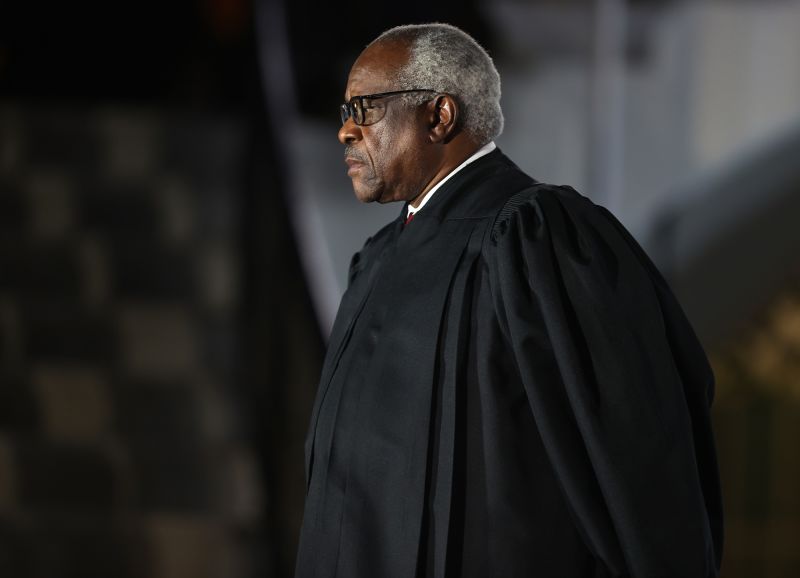Sources close to Thomas say that Clarence Thomas plans to amend his financial disclosure form to reflect the 2014 real estate transaction he had with a GOP Megadonor. This is an acknowledgement that this deal should have been disclosed nearly a decade earlier, they said.
Thomas and Harlan Crow are friends who have been working together for many years. The deal involves selling three Georgia properties including the house where Thomas’ mother Leola, aged 94, lives.
Source: Thomas always fills out his forms with help from aides. It was an oversight to not report the real estate deal. According to the source, Thomas thought he did not have to report the real estate transaction because he had lost money.
Thomas will review and amend the forms as necessary, the source stated.
ProPublica is a nonprofit news agency that investigated the ties between Thomas Crow. ProPublica reports that Crow has made more than $10m in publicly reported political contributions, and has supported efforts to shift the judiciary towards the right.
Thomas has also been criticized for failing to report luxury travel he took with his wife Ginni Thomas and the Crows. This included trips on a donor’s private jet and yacht. In a rare public statement, the justice said that he had been told at the time he didn’t have to report the luxury travel he and his wife took with the Crows. This included trips on the donor’s yacht and private jet.
Critics say Supreme Court justices need to be more open about their personal lives. The court has also been asked by critics and Congressmen to adopt an ethics code.
Sheldon Whitehouse of Rhode Island, Hank Johnson of Georgia and about twenty other Democratic members of Congress have asked Chief Justice John Roberts for an investigation. They are also asking the Judicial Conference (a policy-making body of the federal courts) to refer Thomas to US Attorney General for possible violations of the Ethics in Government Act of 1979.
In a joint press release, Whitehouse and Johnson stated that there was “reasonable cause” to believe Justice Thomas deliberately disregarded the disclosure requirements to report his sale of the Savannah properties to conceal the extent of the financial relationship he had with Crow.
Thomas, his mother Leola, and the family of his deceased brother were all involved in this deal. Crow purchased Thomas’ mother’s house at 542 East 32nd Street, Savannah as well as two other homes that had been rented out for a while.
The source stated that Williams, who was 85 years old at the time, received an occupancy agreement as part of the sale price to allow her to continue living in the house for the rest or her life. She pays no rent but must pay property taxes and insurance.
Crow told CNN in a recent statement that he bought the Thomas property to “create a museum dedicated to telling our nation’s story about the second black Supreme Court justice.”
He said that he purchased the homes at “market rates based on many different factors, including size, quality and livability.”
The other two properties have been sold.
Thomas and his wife spent $50,000 to $75,000 on capital improvements in his mother’s house, but when the sale was complete, Thomas received $44,000 as a result, the source said. Thomas did not report the sale because he thought that there was nothing to gain.
The financial disclosure form’s section VII clearly states that “transactions” must be reported regardless of whether there was a profit or loss.
Gabe Roth, who is the head of Fix the Court and advocates greater transparency in the court, stated that failure to disclose the deal with the real estate appears to be in violation of federal law, the Ethics in Government Act of 1979.
Roth wrote in an email that “he should have included the transaction under Part VII of his 2014 Disclosure, but he did not.”
If you are a Supreme Court Justice and sell property that you own, then you must include the transaction in your disclosure. Roth explained that the law requires this, even if Justice Thomas loses money and the sale is to build a future museum.
Roth said that the public had a right to know about top officials’ property purchases and sales.
Mike Davis, who was a former clerk for Justice Neil Gorsuch and also worked on nominations at the Senate Judiciary Committee, called Thomas’s critics “repackaged smears.”
Davis stated that “Justice Clarence Thomas was a great man and the Democrats latest political attacks were simply repackaged smears of a 31-year hate campaign to punish and delegitimize an independent Black Justice who is conservative.”
Thomas has not publicly commented on the real estate transaction. Thomas noted that regulations have changed since the first reports of his luxury travels with the Crows. He said he would “follow the guidance going forward.”
Thomas has not had to change his financial disclosures for the first time. In 2011, Thomas amended his prior forms in order to reflect the income that his wife received between 1998 and 2002 from Heritage Foundation, an conservative think tank. Thomas stated that the information had been “inadvertently” omitted. The filing was made after Common Cause raised questions.
Thomas did not include reimbursements for time spent at Creighton University School of Law in 2017. Thomas also updated his 2018 disclosure in order to include transportation and meals incurred while teaching at two different universities. Thomas made these changes in response to inquiries raised by the Fix the Court group.
